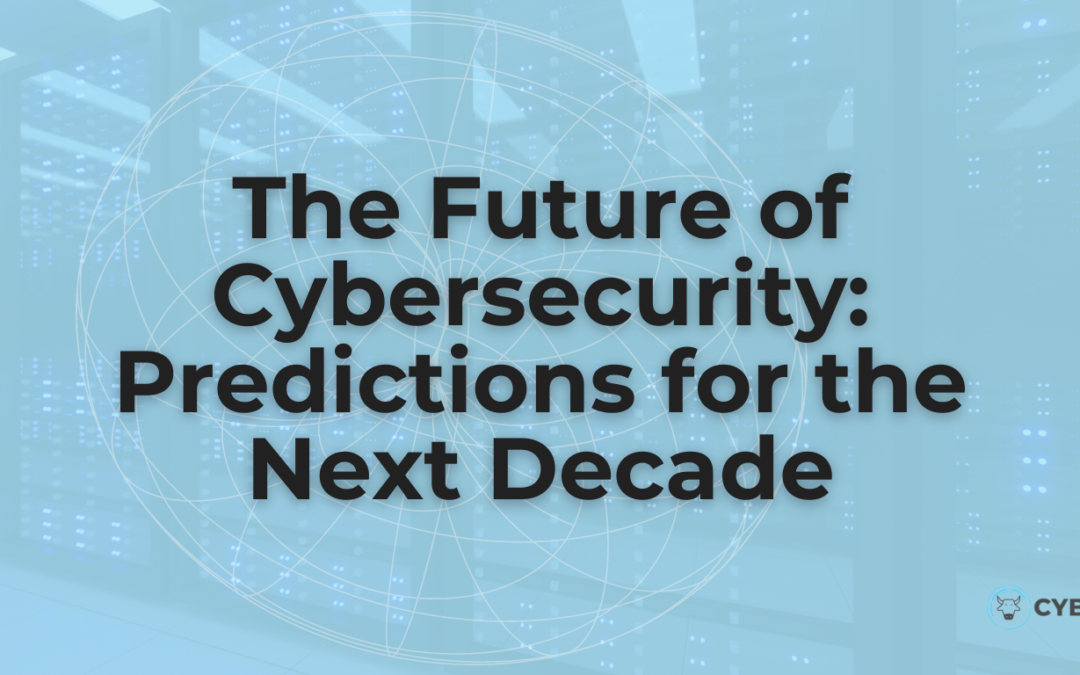Curious about where cybersecurity is headed? We certainly are at OxCyber, so we’ve written this blog article to dive into the key trends, technologies, and predictions that we feel will define digital security over the next ten years. We’ll explore the innovations shaping the industry and provide insights for anyone keen on staying ahead in this rapidly advancing field.
With cyber threats becoming more complex, staying ahead in cybersecurity has never been more critical. Being proactive and informed about emerging trends and technologies is essential. In this article, we’ll examine the predictions and advancements set to transform cybersecurity in the coming decade, offering insights for those committed to protecting their digital world.
Our Predictions for the Next Decade
AI and Machine Learning’s Expanding Role
Artificial intelligence (AI) and machine learning are already revolutionising cybersecurity and will continue to do so. These technologies will enable faster, more accurate analysis of vast data sets, helping organisations detect and respond to threats more efficiently. As AI-driven tools evolve, they will bring advanced analytics to the forefront, allowing for proactive threat mitigation.
Growing Emphasis on Data Privacy
As data generation and processing continue to surge, protecting personal and organisational information will become even more crucial. Companies will need to strengthen their security measures to protect sensitive data and comply with increasingly tighter regulations. Expect a heightened focus on encryption and additional security layers to maintain data privacy and integrity.
Quantum Computing’s Dual Impact
Quantum computing is not just on the horizon, it’s here and with it bringing both opportunities and challenges to cybersecurity. While it promises to revolutionise industries, it also poses a risk to current encryption methods. The industry will need to develop new cryptographic techniques to protect data in a world where quantum computing is a reality.
Emerging Cybersecurity Trends
Zero Trust Security Models on the Rise
The traditional approach of securing the network perimeter is becoming outdated. Zero trust models, which verify every access attempt regardless of origin, will continue to gain traction. This approach minimises the impact of breaches by ensuring that access is continuously monitored and verified.
Blockchain Technology Integration
Blockchain’s decentralised, tamper-evident design will increasingly be used in cybersecurity. By incorporating blockchain, organisations can secure digital transactions, identity management, and data storage. Its immutable nature makes it a powerful tool for ensuring the authenticity and integrity of digital assets.
The Expanding IoT and Its Security Challenges
The rapid growth of Internet of Things (IoT) devices introduces new security concerns. As these devices become more widespread, there will be a greater need to secure the data they generate and the devices themselves. Cybersecurity experts will need to develop specialised skills to tackle the unique challenges posed by the expanding IoT landscape.
Technologies Shaping the Future
Advancements in Cloud Security
As cloud services become more integral to business operations, cloud security will advance to meet new threats. AI and machine learning will enhance cloud security platforms, enabling real-time threat detection and response, and ensuring the safety of cloud-stored data.
Autonomous Security Systems
Looking forward, we’ll see the rise of autonomous security systems capable of detecting, analysing, and responding to threats without human intervention. These systems will use AI, robotic process automation, and advanced analytics to swiftly neutralise potential threats, significantly reducing response times.
Evolution of Biometric Authentication
Biometric authentication, including fingerprint and facial recognition, will continue to evolve as a secure method of identity verification. With ongoing advancements in AI, big data, and machine learning, biometric authentication will become more reliable and widely used.
The next decade in cybersecurity will bring significant advancements, from AI-driven analytics and blockchain integration to quantum computing and biometric authentication. Staying informed about these trends and technologies is crucial for anyone involved in digital security.
TL;DR:
The future of cybersecurity holds exciting developments that will shape the digital landscape in the next decade. From the increased focus on AI and machine learning to the integration of blockchain technology and the evolution of biometric authentication methods, staying informed and proactive in cybersecurity is more important than ever.
As we look ahead to the future of cybersecurity, it is crucial for individuals and organisations to stay updated on the latest developments and trends in digital security. By understanding the upcoming technologies and predictions, we can collectively contribute to maintaining a secure digital environment. Remember, each one of us plays a vital role in upholding digital security, and staying informed is the first step towards achieving this goal.

